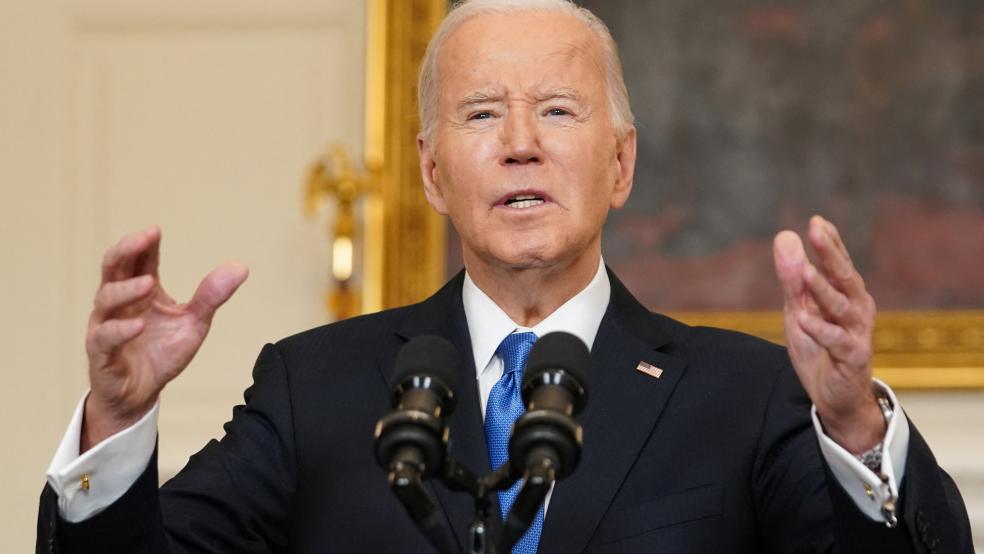President Joe Biden on Tuesday issued an urgent and impassioned call for Speaker Mike Johnson to let the House immediately take up a $95.3 billion package of aid to Ukraine, Israel and Taiwan after the Senate passed the bill early in the morning.
“There’s no question that if the Senate bill was put on the floor in the House of Representatives, it would pass,” Biden said in afternoon remarks from The White House. “It would pass, and the speaker knows that. So I call on the speaker to let the full House speak its mind and not allow a minority of the most extreme voices in the House to block this bill even from being voted on.”
Biden addressed House Republicans who oppose providing further aid to Ukraine, saying the funding is imperative to counter the aggression of Russian President Vladimir Putin.
“If we don’t stop Putin’s appetite for power and control in Ukraine, he won’t limit himself just to Ukraine, and the cost for America and our allies and partners is going to rise,” the president said. “For Republicans in Congress who think they can oppose funding for Ukraine and not be held accountable, history is watching.”
Biden said the stakes had risen because of former president Donald Trump’s recent comment that he would encourage Russia to do “whatever the hell they want” to any NATO country that falls short of spending 2% of its gross domestic product on defense.
Biden blasted those comments and what he described as Trump’s “transactional” view of NATO. “For God’s sake, it’s dumb, it’s shameful, it’s dangerous, it’s un-American,” he said.
Biden also made a point of telling the public that the funds for Ukraine would be spent domestically, replenishing weapons stockpiles “made right here in America by American workers.”
Opposition in the House: The Senate vote saw 22 Republicans join nearly all Democrats in support of the measure, which passed by a 70-29 margin after an all-night session.
“These past few months have been a great test for the U.S. Senate to see if we could escape the centrifugal pull of partisanship and summon the will to defend Western democracy when it mattered most,” Senate Majority Leader Chuck Schumer said after the vote. “Today, the Senate has resoundingly passed the test.”
But even before the Senate’s bipartisan vote, Johnson indicated that he likely would not allow the House to take up the bill, which Trump and many House Republicans oppose. Johnson criticized the Senate plan for excluding border security provisions and his position on the foreign aid bill stands in stark contrast to that of Republican Senate Minority Leader Mitch McConnell, who has repeatedly urged his conference to stand with Ukraine. Senate Republicans last week rejected a bipartisan border deal — a compromise that Johnson had also variously criticized as insufficient and unnecessary, contributing to its quick demise.
“House Republicans were crystal clear from the very beginning of discussions that any so-called national security supplemental legislation must recognize that national security begins at our own border,” Johnson said in a statement Monday evening, adding that the Senate “should have gone back to the drawing board” instead of delivering a bill that is “silent on the most pressing issue facing our country.”
Democratic Sen. Chris Murphy of Connecticut, who spent months negotiating the Senate’s bipartisan border deal, expressed frustration over Johnson’s stance.
“[T]he speaker said he wouldn’t pass ukraine funding without a border deal and we got a deal and then he killed the deal because he said we didn’t need a deal and now he says he won’t pass our ukraine funding bill bc it doesn’t include a border deal,” Murphy said in a social media post devoid of capitalization, adding “honestly” and “wtf.”
The bottom line: Johnson now faces a crucial decision and immense pressure. He insisted that “the House will have to continue to work its own will on these important matters,” suggesting that he is not taking up the Senate bill anytime soon. He is, however, trying again to impeach Homeland Security Secretary Alejandro Mayorkas tonight.
Democrats, meanwhile, hope to force Johnson’s hand via a discharge petition, which would require at least four Republicans to sign on — or potentially more, given some Democratic opposition to additional funding for Israel. Any House action on the aid bill under this process reportedly is unlikely to happen until the end of the month.





